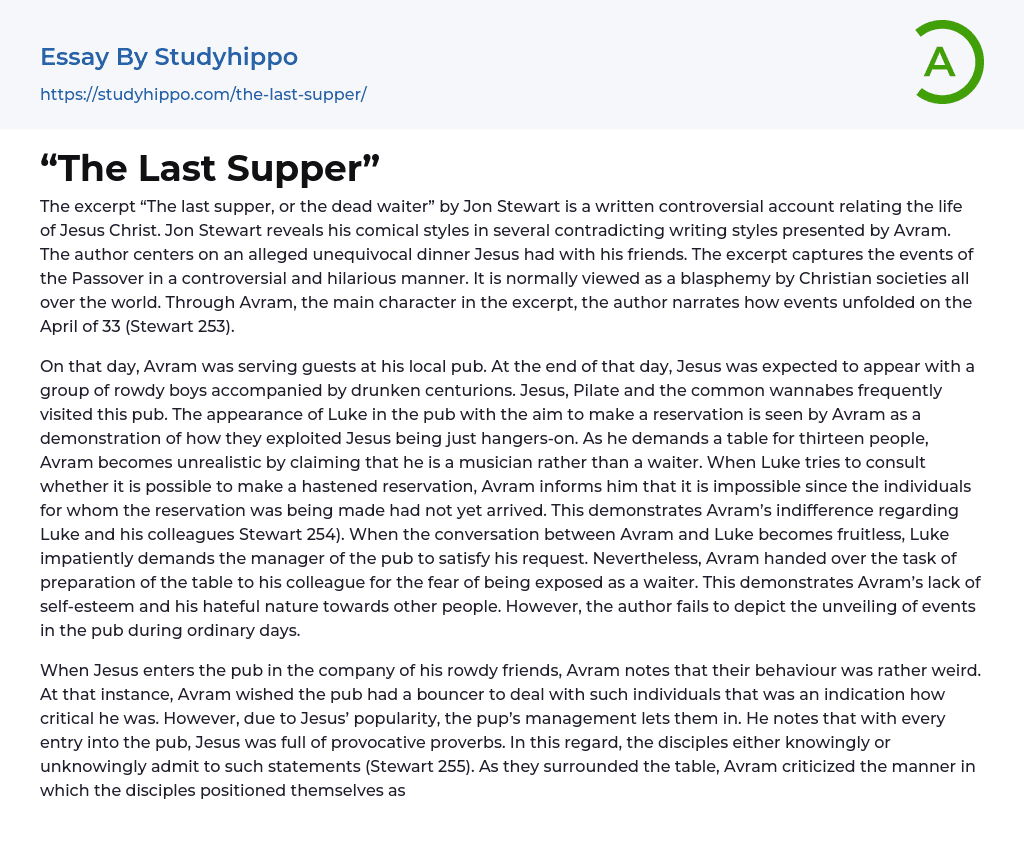The excerpt “The last supper, or the dead waiter” by Jon Stewart is a written controversial account relating the life of Jesus Christ. Jon Stewart reveals his comical styles in several contradicting writing styles presented by Avram. The author centers on an alleged unequivocal dinner Jesus had with his friends. The excerpt captures the events of the Passover in a controversial and hilarious manner. It is normally viewed as a blasphemy by Christian societies all over the world. Through Avram, the main character in the excerpt, the author narrates how events unfolded on the April of 33 (Stewart 253).
On that day, Avram was serving guests at his local pub. At the end of that day, Jesus was expected to appear with a group of rowdy boys accompanied by drunken centurions. Jesus, Pilate and the common wannabes f
...requently visited this pub. The appearance of Luke in the pub with the aim to make a reservation is seen by Avram as a demonstration of how they exploited Jesus being just hangers-on. As he demands a table for thirteen people, Avram becomes unrealistic by claiming that he is a musician rather than a waiter. When Luke tries to consult whether it is possible to make a hastened reservation, Avram informs him that it is impossible since the individuals for whom the reservation was being made had not yet arrived. This demonstrates Avram’s indifference regarding Luke and his colleagues Stewart 254). When the conversation between Avram and Luke becomes fruitless, Luke impatiently demands the manager of the pub to satisfy his request. Nevertheless, Avram handed over the task of preparation of the table to his colleague for th
fear of being exposed as a waiter. This demonstrates Avram’s lack of self-esteem and his hateful nature towards other people. However, the author fails to depict the unveiling of events in the pub during ordinary days.
When Jesus enters the pub in the company of his rowdy friends, Avram notes that their behaviour was rather weird. At that instance, Avram wished the pub had a bouncer to deal with such individuals that was an indication how critical he was. However, due to Jesus’ popularity, the pup’s management lets them in. He notes that with every entry into the pub, Jesus was full of provocative proverbs. In this regard, the disciples either knowingly or unknowingly admit to such statements (Stewart 255). As they surrounded the table, Avram criticized the manner in which the disciples positioned themselves as per their closeness to Jesus. Notably, Avram observes the nature of the disciples’ sycophancy regarding Jesus in that his statements were authoritative.
At some point Avram wished that he was not present to witness such a scene, but since he was penniless, he had to serve at such late hours. He was later ordered to serve waterr for washing Jesus’ feet and a glass of wine which they shared amongst themselves. The disciples later realized how Avram was disappointed at their presence and doubted how he would handle their food. The author, however, failed to capture the scene where Jesus’ feet were washed.
Later, when the guest had settled down, everyone requested for lamb, with the exception of John who had taken lamb for lunch. However, here, the author makes an assumption since Avram was not present when John and
his colleagues had lunch. Furthermore, they took their lunch at a different place. Through Avram, the author sarcastically shows how Jesus and his colleagues feasted. To Avram, Jesus’ behavior seemed normal contradicting his popular outlook of the miracle performer. At the dinner table, Avram notes that Jesus repeatedly asked his disciples whether his beard looked smart.
When Avram later found out that Jesus was dining with his betrayer, he was greatly disappointed. He noted that Jesus’ disciples only followed him due to his popularity and mockingly describes how none of them wanted to take responsibility for their expenditures when the bill was brought to them (Stewart 256). The author, however, fails in terms of chronology of events. Since this was the alleged last supper, Avram should not have pinpointed Jesus’ betrayer as the betrayal happened after the last supper.
- Adam And Eve essays
- Baptism essays
- Catholic Church essays
- Christian essays
- Church essays
- Crucifixion Of Jesus essays
- Crusades essays
- Elizabeth essays
- Eucharist essays
- God The Father essays
- Holy Spirit essays
- Jesus Christ essays
- Lord essays
- Pope essays
- Priest essays
- Protestant Reformation essays
- Protestantism essays
- Sacrament essays
- Allegory essays
- Alliteration essays
- Comedy essays
- Comic book essays
- Drama essays
- Dystopia essays
- Fairy Tale essays
- Fantasy essays
- Fiction essays
- Ghost essays
- Gothic Fiction essays
- Gothic Literature essays
- Irony essays
- Legend essays
- Memoir essays
- Novel essays
- Poetry essays
- Satire essays
- Science Fiction essays
- Short Story essays
- The western essays
- Tragedy essays
- Witchcraft essays




